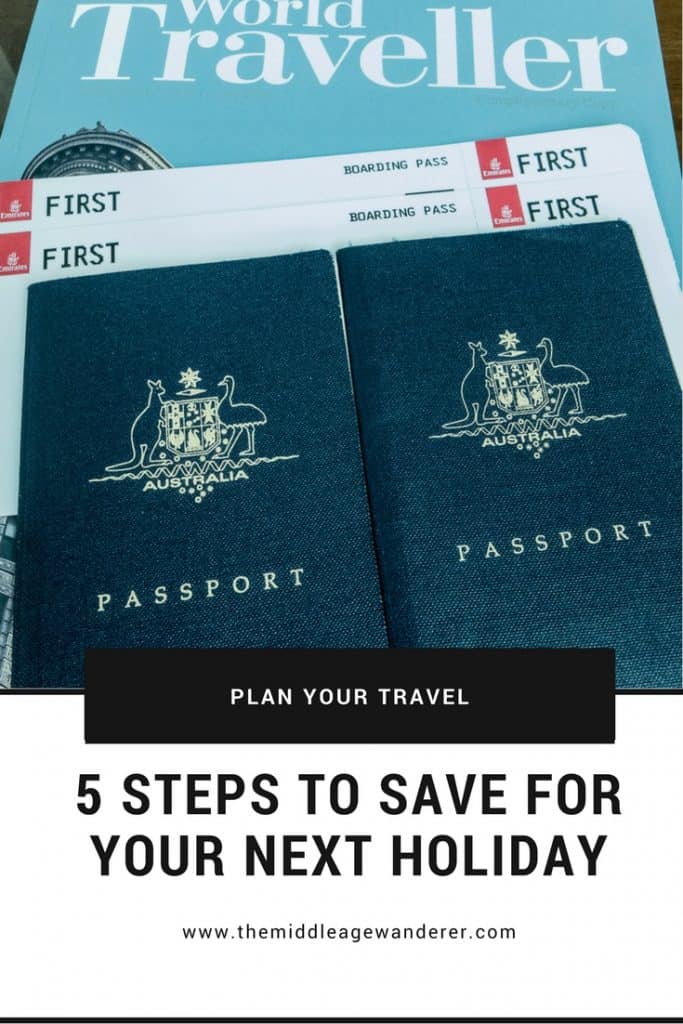Do you struggle with how to save for a holiday?
We travel as much as we can. Luckily in Australia, it is standard that everyone with full time employment receives a minimum of 4 weeks annual leave or holidays every year. On top of that we get on average 10 public holidays a year (this include Christmas and Easter). Many employers now also give employees the option to “buy” annual leave. This means, for example you can take an extra weeks leave (making it 5 weeks a year) and reduce your annual income by one weeks pay spread out over the year.
But how do you save to be able to travel some or all of that time? These are 5 steps on how we have saved and continue to save for our holidays. They work for us. But you need to work out if they can be helpful to you. (Note – if you are unsure about your finances, you can always talk to an accountant or financial adviser)
I hope these 5 steps will help you think about how to save for a holiday and not just your next holiday, but for many more into the future.
Step 1: How Much Can You Save From Each Pay?
Your first step is to realistically work out how much you can save for a holiday from each and every pay. And I do mean “realistically”. If you say you can put away $200 per pay but that is a struggle and realistically it was more like $100 per pay, you will probably need to dip into your holiday savings for things other than your holiday. You don’t want to be doing that.
Also, work out the amount per pay. For example, if you are paid weekly, how much can you put aside each week, not each month. If you are paid monthly, how much can you put aside each month.
So how do you work out how much you can save? It means working out a budget. Noooo!!! I hear you scream! It’s easy for me, I’m an accountant. But a budget isn’t hard to work out if you don’t have one. Work out what your income is (if you have two incomes, include both) and work out your expenses (including those nasty yearly expenses such as insurance and car registration). Once you have worked out your budget (and hopefully you have extra funds available), work out how much of those funds you want to include in the new line on your budget – Holiday.
Worked out an amount? Great.
Step 2: Open a separate bank account for holiday savings
step 3: open the bank account at another bank
step 4: select the bank account that's best for you
- You don’t want to pay bank fees if possible. The first preference is of course, to find a bank account that doesn’t charge fees. If there are bank fees make sure they won’t be more than the interest you will receive otherwise you will be going backwards.
- Try to find a good interest rate. This is pretty hard with the current economic conditions, but shop around.
- Some banks offer bonus interest, for example if you make at least one deposit and no withdrawals in a month.
- Don’t be tempted to get an ATM card on the account – you don’t want the temptation of making withdrawals that aren’t holiday related. If the bank does give you one, put it away for safe keeping (and not in your wallet or purse).
step 5: set up an automatic transfer after each pay day
Make it as easy as possible to save for your holiday. Arrange for your holiday budget amount to be automatically transferred to your holiday bank account a day or two after you receive your pay. If you are paid weekly, that means it’s a weekly transfer. Don’t leave it until the end of the month – you may have already spent your holiday money on other things. Just check with your bank that they don’t charge fees for automatic transfers.
Has your suitcase ever gone missing when travelling? Try packing using my Half and Half Rule.
Pin It



These tips are great because they’re so practical. Having an account at a separate bank is a great idea! Coming from the U.S., four weeks of vacation sounds luxurious. If I weren’t self-employed I would consider moving to Australia!
Thanks Theresa. It is our tried and tested method of saving for travel that we’ve used for a long time. And four weeks leave a year is definitely amazing!
These are all great tips. I think transferring the money automatically into another bank account means you kinda forget about it. Thanks for sharing!
Thanks Carly. And automatically transferring to another account just makes it so much easier.
I never thought about opening a separate bank account. I’m pretty good at knowing what money I have in savings and what it’s alloted for. I always put money aside each month, but I also do what I can to not spend money needlessly – so no going out for lunch during the work week, no going out to dinner because I’m feeling lazy, etc. But your tips are certainly a strong start.
Thanks April. We use a separate bank account as it’s a way of putting it away and not thinking about it until you need it to pay for your travel. And having it at a different bank means that when logging into internet banking you’re not tempted to transfer money from it for other reasons.
Yep, I save travel money the exact same way and it works very well. Thanks for the tips.
Thanks Pia. It’s tried and tested for us too and allows us to travel whenever we want.
These are great tips! I’ve always been a big saver but I know it can be really difficult if you’re not in a saving ‘routine’
Thanks Alex. It’s so true, it really is all about a savings routine.
I’d say the separate bank account is an essential for travel. The automatic transfer makes life easier, and you can always look at the balance on your regular account and decide if you can afford to occasionally add another $50 or $500 to your holiday account.
Totally agree Annie. And topping up when you can is a great idea too.
Super useful tips, thank you!
Thanks Dulcie!
These are great tips. I never considered opening an account at a completely separate bank. I can see why that would be so helpful though. Thanks for sharing!
The different bank is really helpful Michelle!
Such a great post. A separate bank account is so important to make sure that you’re allocating the right amount of money to achieving your travel goals!
Absolutely Clare.
I am so terrible at this. Every time I open a savings account I end up having to dig into it and I close it like a year later. Either I just don’t make enough extra disposable income (I’ve never made more than 38K-ish a year), or I’m forgetting to factor in some underlying expenses that I’m apparently making. I hope I’ll figure it out this time around; in the past if I want to travel I just quit whatever job I have and spend my last paycheck on it lol. But now I want to stick around and build a little.
Budgeting is the hardest part Claire. A tip with budgeting, keep a spreadsheet for a couple of months of your expenses and see what expenses are on it that you normally wouldn’t have budgeted for.